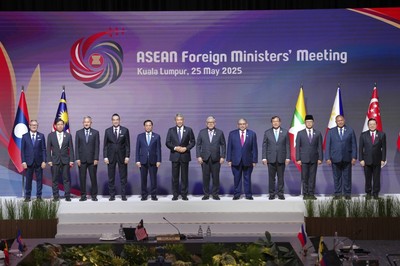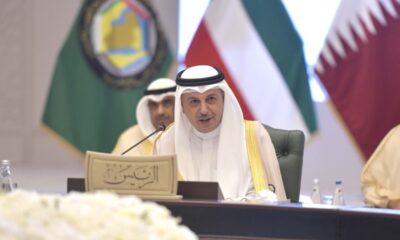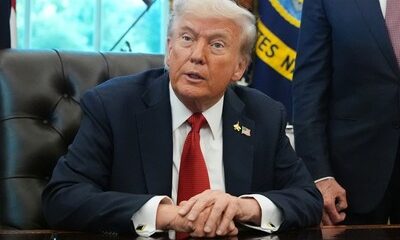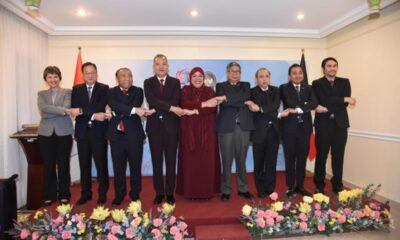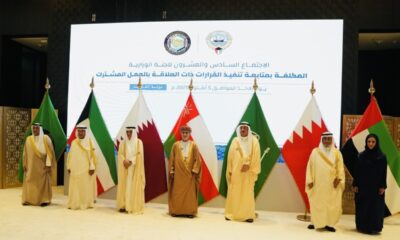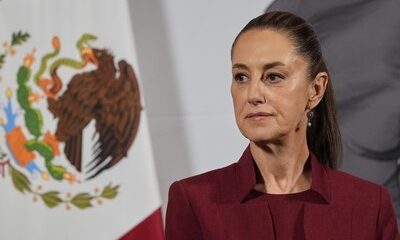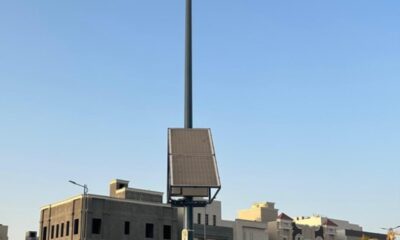ASEAN Foreign Ministers line up for a photo call at the start of the Association of Southeast Asian Nations (ASEAN) Foreign Ministers’ Meeting opening ceremony in Kuala Lumpur, Malaysia on May 25. They are from left to right, Lao Foreign Minister Thongsavanh Phomvihane, Myanmar Permanent Secretary of the Ministry of Foreign Affairs Aung Kyaw Moe, Singaporean Foreign Minister Vivian Balakrishnan, Thailand’s Foreign Minister Maris Sangiampongsa, Vietnam’s Foreign Minister Bui Thanh Son, Malaysia’s Foreign Minister Mohamad Hasan, Philippine Foreign Minister Enrique Manalo, Bruneian Foreign Minister Erywan Pehin Yusof, Cambodian Foreign Minister Prak Sokhonn, Indonesia’s Foreign Minister Sugiono, East Timor’s Foreign Minister Bendito Freitas, and ASEAN Secretary-General Kao Kim Hourn. (AP)
KUALA LUMPUR, Malaysia, May 25, (AP): Southeast Asian nations must accelerate regional economic integration, diversify their markets and stay united to tackle the fallout from global trade disruptions resulting from sweeping US tariff hikes, Malaysian Foreign Minister Mohamad Hasan said Sunday. Mohamad, opening a meeting of foreign ministers from the Association of Southeast Asian Nations, also reiterated the bloc’s call to warring parties in Myanmar to cease hostilities in a deadly civil war that has killed thousands and displaced millions of people since a 2021 government takeover by the military.
“ASEAN nations are among those most heavily affected by the US-imposed tariffs. The US-China trade war is dramatically disrupting production and trade patterns worldwide. A global economic slowdown is likely to happen,” Mohamad said. “We must seize this moment to deepen regional economic integration, so that we can better shield our region from external shocks.”
ASEAN countries, many of which rely on exports to the US, are reeling from tariffs imposed by President Donald Trump’s administration ranging from 10% to 49%. Six of the association’s 10 member nations were among the worst-hit with tarrifs ranging from 32% to 49%. This would likely affect ASEAN’s targeted growth forecast of 4.7% this year, trade officials said.
ASEAN has not been able to secure a meeting with the U.S. as a bloc. But when US President Donald Trump last month announced a 90-day pause on the tariffs, countries including Malaysia, Indonesia, Thailand and Vietnam swiftly began trade negotiations with Washington. The meeting of foreign ministers preceded a planned ASEAN leaders’ summit Monday in Malaysia, the bloc’s current chair. In a bid to bolster economic partnerships, ASEAN leaders also are scheduled to hold a joint summit Tuesday with Chinese Premier Li Qiang and leaders from the Gulf Cooperation Council comprising Bahrain, Kuwait, Oman, Qatar, Saudi Arabia and the United Arab Emirates.

 Latest News22 hours ago
Latest News22 hours ago
 Politics15 hours ago
Politics15 hours ago
 Latest News16 hours ago
Latest News16 hours ago
 Latest News14 hours ago
Latest News14 hours ago
 Politics6 hours ago
Politics6 hours ago
 Politics5 hours ago
Politics5 hours ago
 Latest News6 hours ago
Latest News6 hours ago
 Business6 hours ago
Business6 hours ago
